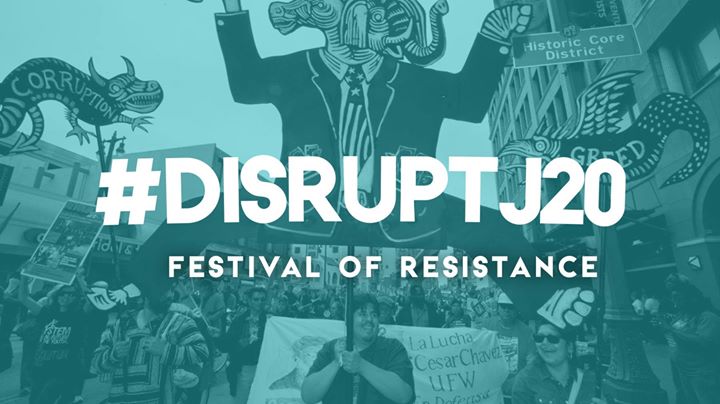; Date: Tue Aug 15 2017
Tags: Anti-Fascism »»»» Freedom of Speech »»»»
Web hosting provider Dreamhost is fighting a Dept of Justice order to release broad-ranging data about visitors to a website that organized protest rallies in Washington DC on January 20, 2017. That was Trumps inauguration day, and saw large protests, which the Dept. of Justice's Search Warrant called riots, against Donald Trump. The information demanded by the DoJ is "highly untargeted" and includes visitor IP addresses, along with contact information, email content, and photos of thousands of people. According to Dreamhost, the web hosting provider, the DoJ's search warrant is an attack on freedom of speech, freedom of assembly, and freedom of association. Last weekend a protest by NEO-Nazi white supremacists in Charlottesville Virginia was intended to "protect" a statue of Civil War leader Robert E. Lee. That protest turned very violent, including an incident of a car used as a battering ram to drive into a crowd of peaceful anti-fascist protesters, killing one and injuring dozens of other people. In the wake of that protest the Daily Stormer website, billed as the most Genocidal website on the planet, has taken offline by web hosting provider GoDaddy over Terms of Service violations. Reportedly the Daily Stormer's staff has tried to shift web hosting to other providers, but has yet to find an agreeable hosting provider. Seems that publishing a website encouraging people to violence is against the terms of service. What's common from these extreme ends of the political spectrum is the role the web hosting provider plays in implementing our right to freedom of speech, freedom of assembly, and freedom of association. Any group denied the ability to host a website cannot speak their message to the world. Guaranteeing freedom of Speech and the other freedoms means guaranteeing that freedom for everyone, including those with whom you disagree.
What's a Web Hosting Provider?
This website is hosted on Dreamhost servers, as are my other websites. I'm very happy to see Dreamhost making the effort to protect privacy rights of visitors to websites hosted on Dreamhost servers. Let's start this by reviewing what a web hosting provider does.
Web hosting providers operate webservers. They rent space on those webservers to folks who want to build websites.
It's impractical for most people to own their own webserver. Hosting a website means organizing a high-bandwidth Internet connection, and a reliable webserver that will run 24 hours a day 365 days a year. You have to keep up with security configuration, track security updates to the website software, and on and on and on.
It's best to instead turn to a service provider. Their trained staff can set up and manage all the equipment, internet routing configuration, software configuration, security policies, and on and on, all for a modest fee.
Web hosting providers provide hosting service -- they do not own the websites
A web hosting provider is akin to a hotel owner or apartment building owner. Both operate infrastructure which people rent so those people can pursue their interests. A typical apartment building is occupied by people who simply want a place to live, for example.
Therefore, a web hosting provider does not own or operate the websites hosted on its servers. Those sites are owned/operated by the people who rent hosting service.
Freedom of speech requires a web hosting provider
A key guarantee in the USA's are the right of freedom of speech and several other freedoms.
Exercising those freedoms in today's environment more-or-less requires a website. As we just said, owning a website in turn requires working with a web hosting provider.
Alternatively the web presence could be on a social media network like Facebook, where Facebook Pages or Groups can be an excellent tool for getting out ones message.
Bottom line is that exercising freedom of speech on the Internet means relying on a 3rd party to carry your speech to the world. That's little different from pre-Internet days where sending your message to the world required a printing press.
Dreamhost and DisruptJ20

The other day Dreamhost wrote on their blog (
https://www.dreamhost.com/blog/we-fight-for-the-users/) that
For the past several months, DreamHost has been working with the Department of Justice to comply with legal process, including a Search Warrant (PDF) seeking information about one of our customers’ websites.
That website,
disruptj20.org, "organized participants of political protests against the current United States administration." The "J20" part of the name meant January 20, or the date of Donald Trump's inauguration. According to Google Image Search on search terms related to this, it seems there was violence and fire and fights with the police in Washington DC on that day.
Search Warrant:
https://www.dreamhost.com/blog/wp-content/uploads/2017/08/DH-Search-Warrant.pdf
The search warrant claims that some unspecified electronic premises controlled by Dreamhost -- in other words the webservers operated by Dreamhost -- contained "concealed property, namely stored electronic communications including but not limited to digital files, records, messages" that are described more fully in the attachments. Naming violations of D.C. Code section 22-1322, the Search Warrant states a belief that the "property" (digital records etc) is stored on the Premises, and the DoJ demands access.
In the attachments the DoJ demands
any messages, records, files, logs, or information that has been deleted but are still available to Dreamhost
all records or other information pertaining to that account or identifier, including all files, databases, database records, stored by Dreamhost in relation to that account or identifier
all information in the posession of Dreamhost that might identify the subscribers related to those accounts or identifiers, including names, addresses, telephone numbers and other identifiers, e-mail addresses, business information, the length of service (including start date), means and source of payment for services (including any credit card or bank account number), and information about any domain name registration
The demands go on to request HTTP and SSH logs, e-mail accounts and their contents, database content, etc.
Dreamhost says that web hosting providers regularly receive such requests. Their legal departments "reviews and scrutinizes each request and, when necessary, rejects and challenges vague or faulty orders." In this case, Dreamhost chose to challenge this particular demand for information.
- The information would identify anyone who simply visited the website. For example when I retrieved the image above, I had to visit the website to do so.
- Especially chilling: "That information could be used to identify any individuals who used this site to exercise and express political speech protected under the Constitution’s First Amendment."
- "This is, in our opinion, a strong example of investigatory overreach and a clear abuse of government authority."
Dreamhost's legal arguments in opposition to DoJ's request:
https://www.dreamhost.com/blog/wp-content/uploads/2017/08/DH-Opposition-Motion.pdf
Dreamhost's motion to show cause:
https://www.dreamhost.com/blog/wp-content/uploads/2017/08/DH-DOJMotiontoShowCause.pdf
Dreamhost is working with the Electronic Frontier Foundation on this request for information by the DoJ.
The EFF's blog post (
https://www.eff.org/deeplinks/2017/08/j20-investigation-doj-overreaches-again-and-gets-taken-court-again) says the Dept of Justice is using unconstitutional means to pursue the investigation into the January 20 protests.
No plausible explanation exists for a search warrant of this breadth, other than to cast a digital dragnet as broadly as possible. But the Fourth Amendment was designed to prohibit fishing expeditions like this. Those concerns are especially relevant here, where DOJ is investigating a website that served as a hub for the planning and exercise of First Amendment-protected activities.
Daily Stormer and GoDaddy

The Daily Stormer (
https://en.wikipedia.org/wiki/The_Daily_Stormer) is a virulently neo-Nazi and white supremacist news and commentary website. It considers itself part of the alt-right movement and the website openly pushes pro-Nazi pro-Hitler pro-Fascist ideological material. The Daily Stormer takes its name from the Nazi Party's tabloid newspaper Der Stürmer which was known for virulently antisemitic caricatures of Jewish people.
The publisher, Andrew Anglin, said he founded The Daily Stormer as "a means to propagandize people … to get them to look at the world in a certain way."
The Wikipedia page has a lot more material - the bottom line is that The Daily Stormer is pushing a virulently violent stance towards any non-White people. It's part of a subculture of modern society who are afraid the White Race is under attack, and that to protect the White Race various violent things need to be done to non-Whites.
On August 13, GoDaddy (the Daily Stormer's former domain registrar) announced on
Twitter that: We informed The Daily Stormer that they have 24 hours to move the domain to another provider, as they have violated our terms of service. Twitter wrote that in response to this request:

A Terms of Service violation was enough to cause the domain registrar to cancel their domain registration. That step severed the link between dailystormer.com and the actual website.
The Daily Stormer's headline sent by Amy Siskind has to do with the woman killed in Charlottesville Virginia. That the Daily Stormer chose to describe it as a "road range incident" rather than a terrorism attack on peaceful protesters should say everything you need to know about The Daily Stormer.
According to news reports, The Daily Stormer has been trying to transfer the domain registration to other domain registrars, including Google Domains. All of whom have refused the domain registration also because of terms of service violations.
Other services used by The Daily Stormer, including Zoho, have also canceled The Daily Stormer's accounts.
https://techcrunch.com/2017/08/15/after-charlottesville-more-web-service-providers-ditch-the-daily-stormer-for-tos-violations/
This morning the
Daily Stormer status account on Twitter announced they'd set up a so-called "Dark Web"
.onion address for the website. Such addresses are outside the regular domain name system and Dark Web services are typically used by those committing illegal acts.
https://www.theverge.com/2017/8/15/16150668/daily-stormer-alt-right-dark-web-site-godaddy-google-ban

The so-called Dark Web are Internet services not reachable using a regular domain name. Anyone pursuing actions against the Terms of Services of regular hosting providers and domain registrars should have their website and/or domain name canceled. Such people can always turn to The Dark Web for those services.
The typical Dark Web website is selling illegal products or services like drugs, unregistered guns, hacking services, and so on. Terrorism websites also exist on The Dark Web. The "Tor" mentioned in that one tweet is an anonymizing service -- supposedly anyone browsing the web through a Tor Browser is anonymous and cannot be traced.
If you look through the twitter threads linked above you'll see a range of responses:




That last raises a great question to ponder. The Daily Stormer website, and plenty of others, are surely publishing stuff every day that violates Terms of Service. Why did GoDaddy and others wait until someone died and there was a big stink in the news before taking action?











